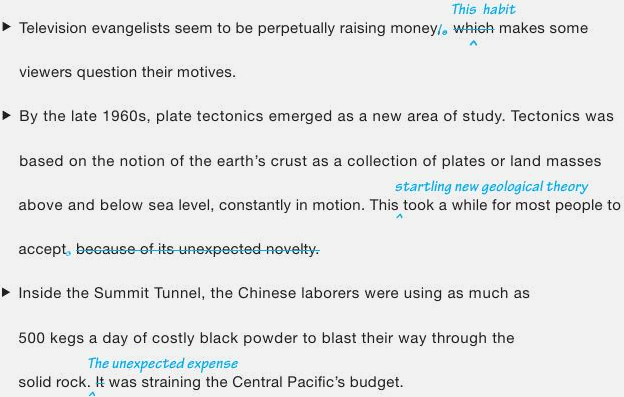Edit and proofread your draft.
A Note on Grammar and Spelling Checkers
These tools can be helpful, but do not rely on them exclusively to catch errors in your text: Spelling checkers cannot catch misspellings that are themselves words, such as to for too. Grammar checkers miss some problems, sometimes give faulty advice for fixing problems, and can flag correct items as wrong. Use these tools as a second line of defense after your own (and, ideally, another reader’s) proofreading and editing efforts.
Our research indicates that particular errors occur often in common ground essays: incorrect comma usage in sentences with interrupting phrases, and vague pronoun reference. The following guidelines will help you check your essay for these common errors.
Using Commas around Interrupting Phrases
What is an interrupting phrase? When writers are analyzing opposing positions, they need to supply a great deal of information precisely and accurately. They add much of this information in phrases that interrupt the flow of a sentence, as in the following example:
The concern was so great that George Mitchell, the former Senate Majority Leader and peace negotiator, was enlisted to investigate. (Bernard, par. 2)
Such interrupting phrases, as they are called, are typically set off with commas.
The Problem Forgetting to set off an interrupting phrase with commas can make sentences unclear or difficult to read.
How to Correct It Add a comma on either side of an interrupting phrase.

Correcting Vague Pronoun Reference
The Problem Pronouns replace and refer to nouns, making writing more efficient and cohesive. If the reference is vague, however, this advantage is lost. A common problem is vague use of this, that, it, or which.
How to Correct It Scan your writing for pronouns, taking special note of places where you use this, that, it, or which. Check to be sure that what this, that, it, which, or another pronoun refers to is crystal clear. If it is not, revise your sentence.
